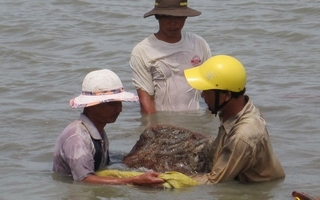 Nguyen Van Kich, General Director of Cafatex Group in Hau Giang province, a big shrimp cultivating area, has confirmed that since the beginning of the year, Chinese have been competing with Vietnamese seafood processing companies to buy shrimp and carry away to China for sale.
Nguyen Van Kich, General Director of Cafatex Group in Hau Giang province, a big shrimp cultivating area, has confirmed that since the beginning of the year, Chinese have been competing with Vietnamese seafood processing companies to buy shrimp and carry away to China for sale.“Not only collecting high quality shrimps, Chinese have accepted low quality products as well. Especially, they even asked farmers to inject impurities into the shrimp to make them heavier,” he said.
“Chinese have been thirsty for shrimp materials that they come directly to the factories in Mekong Delta, offering commissions to ask factories collect shrimp for them,” he continued.
Chu Van An, Deputy General Director of Minh Phu Seafood Group, headquartered in Ca Mau province, has also said that Chinese businessmen now compete directly with Chinese to collect shrimp from farmers right at the shrimp ponds.
According to An, Chinese businessmen collect materials and inject impurities in shrimps to increase the sizes in order to be able to sell at higher prices. Meanwhile, Vietnamese companies, which specialize in making products for export to Japan, the US and South Korea, the choosy markets, don’t want to do this. Therefore, they remain uncompetitive with the Chinese.
The director of a big shrimp export company in Mekong Delta explained that in case of healthy competition, Vietnamese and Chinese need to buy shrimp at VND85,000-90,000 per kilo to be sure of making profit.
However, Chinese would pay VND5000-10,000 per kilo higher than Vietnamese, because they would inject impurities in the shrimps to be able to sell products at higher prices.
Vietnamese seafood companies meeting big difficulties
The shrimp collection by Chinese businessmen has put big difficulties for Vietnamese seafood processors and exporters.
“I have heard that a lot of enterprises which signed the contracts with the Japanese and US partners on exporting shrimp products, now cannot collect materials for processing,” said Kich of Cafatex.
“They are now in the danger of breaking the contract because they cannot make deliveries on schedule,” he added. “They (Chinese) have collected all the shrimps, both big and small, high and low quality.”
An has warned that the scrambling of Chinese businessmen would not only harm Vietnamese exporters, but also the whole seafood industry as well.
“Vietnamese workers would lose their jobs, while potential partners like the US, Japan and South Korea tend to shift to place orders with other suppliers,” An said. “Authentic enterprises would suffer from the uncontrollable shrimp collection”.
According to the Vietnam Association of Seafood Exporters and Producers (VASEP), black tiger shrimp is now selling at VND240,000 per kilo in Ca Mau (20 shrimp per kilo). The price is a bit lower for smaller size shrimp--about VND155,000 per kilo (30 shrimp per kilo). These are the 2-year price high.
Kich has warned that it is very risky to do business with China. “Chinese just need to lower the collection price for one year to make Vietnamese producers suffer,” he said.
Truong Dinh Hoe from VASEP said that in the whole year 2012, Vietnam exported $192 million worth of shrimps to China, or 8.6 percent of the total shrimp export turnover, while the figure was $31.6 million in the first two months of the year.





